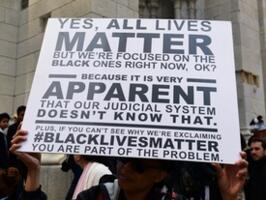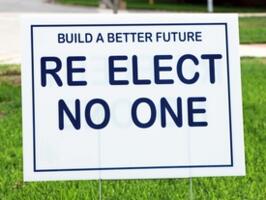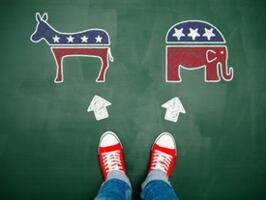Is Equal Justice the Goal of Black Lives Matter?
Black Lives Matter or all lives matter is an ongoing political debate, but most voters aren't convinced that the Black Lives Matter movement is interested in justice for all.

Black Lives Matter or all lives matter is an ongoing political debate, but most voters aren't convinced that the Black Lives Matter movement is interested in justice for all.

In a heated exchange during last week's Republican presidential primary debate, Senator Rand Paul criticized fellow Senator Marco Rubio for his calls to substantially increase defense spending when the United States already spends more on its military than the next 10 countries combined. Turns out just half of U.S. voters are aware of how much this country spends compared to the rest of the world, and a plurality wants the figure to increase.

Hillary Clinton is still in line to win the Democratic Party's nomination to be the next commander in chief, but few Americans in the military have a good impression of her.

Of the many hurdles military veterans face in America today, they name adjusting back to everyday life as the most significant challenge. Many also feel that private companies are not making the adjustment any easier.

As the presidential candidates for both major parties lay out their agendas for the next four years, voters continue to question whether either side really knows where it’s going.

America’s military risk their lives to defend this country, but now they want a better chance to defend themselves, too.

Americans still firmly believe the war on drugs has been a failure, and few think more money will make a difference.

Ohio voters yesterday rejected by nearly a two-to-one margin a ballot initiative that would have legalized both medical and recreational marijuana, but mixing the two into one vote may have been supporters’ biggest mistake.

Even as they worry the federal government is a growing threat to their rights, voters continue to strongly value their basic constitutional freedoms. They are even more supportive now than they have been in the past of their right to bear arms.

The man currently running a distant second for the Democratic presidential nomination, Vermont Senator Bernie Sanders, is a self-declared socialist, and most of his party’s voters now have a positive view of socialism. They are almost evenly divided as to whether they like capitalism or socialism more.

Most voters continue to believe the government should regulate campaign contributions, but they also still feel that publishing the names of all contributors is more important than limiting what they give.

House Speaker John Boehner took his fellow Republicans by surprise when he abruptly resigned in the face of growing criticism from conservatives. The GOP struggled to find a replacement, with Wisconsin Congressman Paul Ryan, the party's 2012 vice presidential nominee, finally talked into stepping up. But do Republican voters expect anything to change in Congress?

American voters still generally have faith in society, though that faith is slipping.

Hillary Clinton is scheduled to testify today before a special congressional committee about the attack in Benghazi that happened while she was secretary of State. Clinton claims the probe is politically motivated, but most voters don't think she's telling the whole story about the incident in Libya three years ago.

California last week became the fifth state to legalize voluntary euthanasia or physician-assisted suicide, and most Americans still support it as an option for terminally ill patients.

Voters are more convinced than ever that the incident in Benghazi, Libya in which the U.S. ambassador was killed on her watch will hurt former Secretary of State Hillary Clinton's bid for the White House, but voters are almost evenly divided over whether the ongoing congressional investigation of the matter is aimed at the truth or is just politically motivated.

Voters continue to feel the federal government is not devoting enough attention to the terrorist threat of radical Islam here at home.

Voters still insist they value substance over more superficial factors when deciding whom to vote for, but they are a bit more likely to admit their emotions play a role.

Voter attitudes about Planned Parenthood have not changed in the nearly three months since the release of the first secretly-taken video showing representatives of the group discussing the sales value of body parts of aborted babies. But for a sizable majority, it’s an issue they’ll remember come election time.

Most U.S. voters still consider the United States the best country in the world, but they don’t think we are winning any popularity contests.